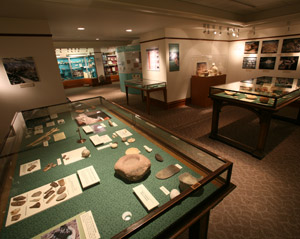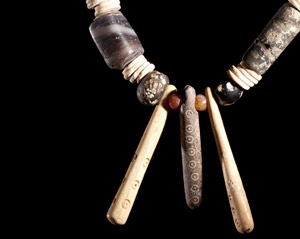 Pittsburgh Theological Seminary has announced an update to the name of its museum. The James L. Kelso Bible Lands Museum is now the Kelso Museum of Near Eastern Archaeology.
Pittsburgh Theological Seminary has announced an update to the name of its museum. The James L. Kelso Bible Lands Museum is now the Kelso Museum of Near Eastern Archaeology.
“Developments in the terminology used by modern archaeologists recently led the Seminary to update the name,” said Dr. Ron Tappy, G. Albert Shoemaker Professor of Bible and Archaeology, director of the Kelso Museum of Near Eastern Archaeology, and project director and principal investigator of the Zeitah Excavations.
The new name recognizes the great geographical breadth of areas that bear on the Bible—for example, in addition to Israel it includes Turkey, Syria, Lebanon, Jordan, Egypt, Iraq, Iran, and other lands. “Near Eastern Archaeology” also incorporates the study of all cultures—both prehistoric and historical—that have existed in this wide expanse of territory.
“Through this name change we hope to reflect that we are a rich education resource for archaeology and ancient history for the region and beyond,” said Dr. Karen Bowden Cooper, curator of the Museum.
 The Kelso Museum of Near Eastern Archaeology has its roots in a program of archaeological field work in the Near East that began in 1924 and focused on modern day Israel, West Bank, and Jordan. Its exhibits highlight daily life in ancient times including landscape and settlement patterns; domestic and communal architecture; agriculture and food preparation; technologies, crafts, and stylistic traditions; trade; religious observance; and memory and writing systems and practice. The Museum is part of a multifaceted archaeology program that includes an on-going excavation at Tel Zayit in Israel as well as academic courses and a lecture program that brings leading archaeologists to Pittsburgh.
The Kelso Museum of Near Eastern Archaeology has its roots in a program of archaeological field work in the Near East that began in 1924 and focused on modern day Israel, West Bank, and Jordan. Its exhibits highlight daily life in ancient times including landscape and settlement patterns; domestic and communal architecture; agriculture and food preparation; technologies, crafts, and stylistic traditions; trade; religious observance; and memory and writing systems and practice. The Museum is part of a multifaceted archaeology program that includes an on-going excavation at Tel Zayit in Israel as well as academic courses and a lecture program that brings leading archaeologists to Pittsburgh.
The Museum is free and open to the public during the academic year Monday-Saturday from 10:00 a.m.- 4:00 p.m. (except holidays), and by appointment. Summer hours are Wednesday-Saturday 10:00 a.m.- 4:00 p.m. To schedule a tour, call 412-924-1395. Visit the website for upcoming lectures and programs: www.pts.edu/Museum.
 Pittsburgh Theological Seminary has announced an update to the name of its museum. The James L. Kelso Bible Lands Museum is now the Kelso Museum of Near Eastern Archaeology.
Pittsburgh Theological Seminary has announced an update to the name of its museum. The James L. Kelso Bible Lands Museum is now the Kelso Museum of Near Eastern Archaeology.
“Developments in the terminology used by modern archaeologists recently led the Seminary to update the name,” said Dr. Ron Tappy, G. Albert Shoemaker Professor of Bible and Archaeology, director of the Kelso Museum of Near Eastern Archaeology, and project director and principal investigator of the Zeitah Excavations.
The new name recognizes the great geographical breadth of areas that bear on the Bible—for example, in addition to Israel it includes Turkey, Syria, Lebanon, Jordan, Egypt, Iraq, Iran, and other lands. “Near Eastern Archaeology” also incorporates the study of all cultures—both prehistoric and historical—that have existed in this wide expanse of territory.
“Through this name change we hope to reflect that we are a rich education resource for archaeology and ancient history for the region and beyond,” said Dr. Karen Bowden Cooper, curator of the Museum.
 The Kelso Museum of Near Eastern Archaeology has its roots in a program of archaeological field work in the Near East that began in 1924 and focused on modern day Israel, West Bank, and Jordan. Its exhibits highlight daily life in ancient times including landscape and settlement patterns; domestic and communal architecture; agriculture and food preparation; technologies, crafts, and stylistic traditions; trade; religious observance; and memory and writing systems and practice. The Museum is part of a multifaceted archaeology program that includes an on-going excavation at Tel Zayit in Israel as well as academic courses and a lecture program that brings leading archaeologists to Pittsburgh.
The Kelso Museum of Near Eastern Archaeology has its roots in a program of archaeological field work in the Near East that began in 1924 and focused on modern day Israel, West Bank, and Jordan. Its exhibits highlight daily life in ancient times including landscape and settlement patterns; domestic and communal architecture; agriculture and food preparation; technologies, crafts, and stylistic traditions; trade; religious observance; and memory and writing systems and practice. The Museum is part of a multifaceted archaeology program that includes an on-going excavation at Tel Zayit in Israel as well as academic courses and a lecture program that brings leading archaeologists to Pittsburgh.
The Museum is free and open to the public during the academic year Monday-Saturday from 10:00 a.m.- 4:00 p.m. (except holidays), and by appointment. Summer hours are Wednesday-Saturday 10:00 a.m.- 4:00 p.m. To schedule a tour, call 412-924-1395. Visit the website for upcoming lectures and programs: www.pts.edu/Museum.
